Marketing Ethics in Coles Supermarket: A Case Study Analysis
VerifiedAdded on 2020/03/16
|10
|2481
|428
Case Study
AI Summary
This case study examines the ethical marketing practices of Coles Supermarket in Australia. The paper analyzes issues such as misleading labeling, specifically the use of "cholesterol free" claims on products containing trans fats, and the potential for consumer deception through the similarity of Coles' branding with the Australian Heart Foundation logo. The study delves into the history of Coles, the products and services it offers, and arguments regarding misleading practices. It explores ethical decision-making approaches, including fairness, well-being, and freedom, while also considering the role of manipulation and deception in Coles' marketing strategies. The case study provides recommendations for ethical improvements, such as clearer labeling and customer education, and concludes by emphasizing the importance of ethical considerations in marketing to protect consumers and maintain trust. The assignment is a contribution to Desklib, a platform for students to access AI-powered study tools and academic resources.
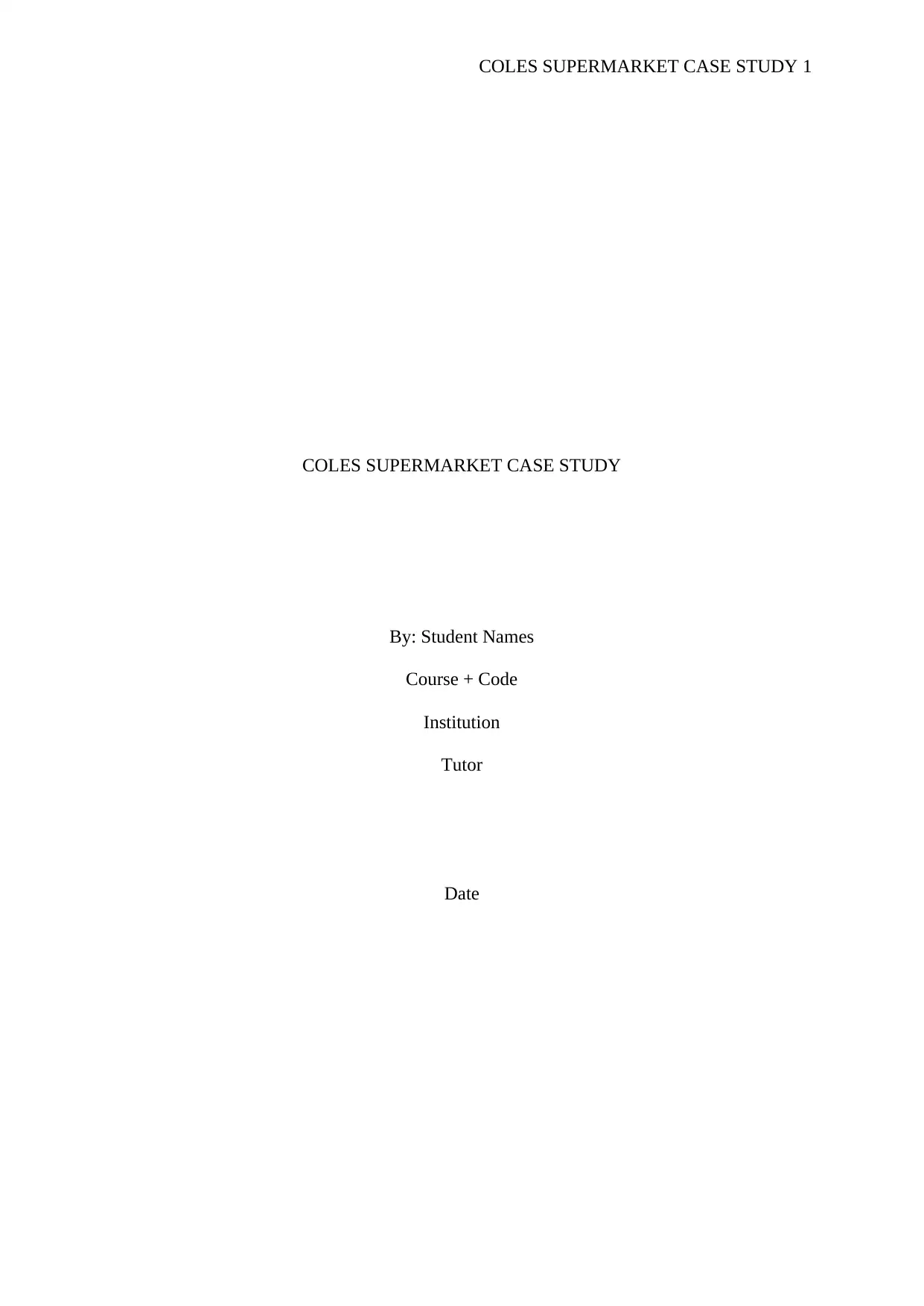
COLES SUPERMARKET CASE STUDY 1
COLES SUPERMARKET CASE STUDY
By: Student Names
Course + Code
Institution
Tutor
Date
COLES SUPERMARKET CASE STUDY
By: Student Names
Course + Code
Institution
Tutor
Date
Paraphrase This Document
Need a fresh take? Get an instant paraphrase of this document with our AI Paraphraser
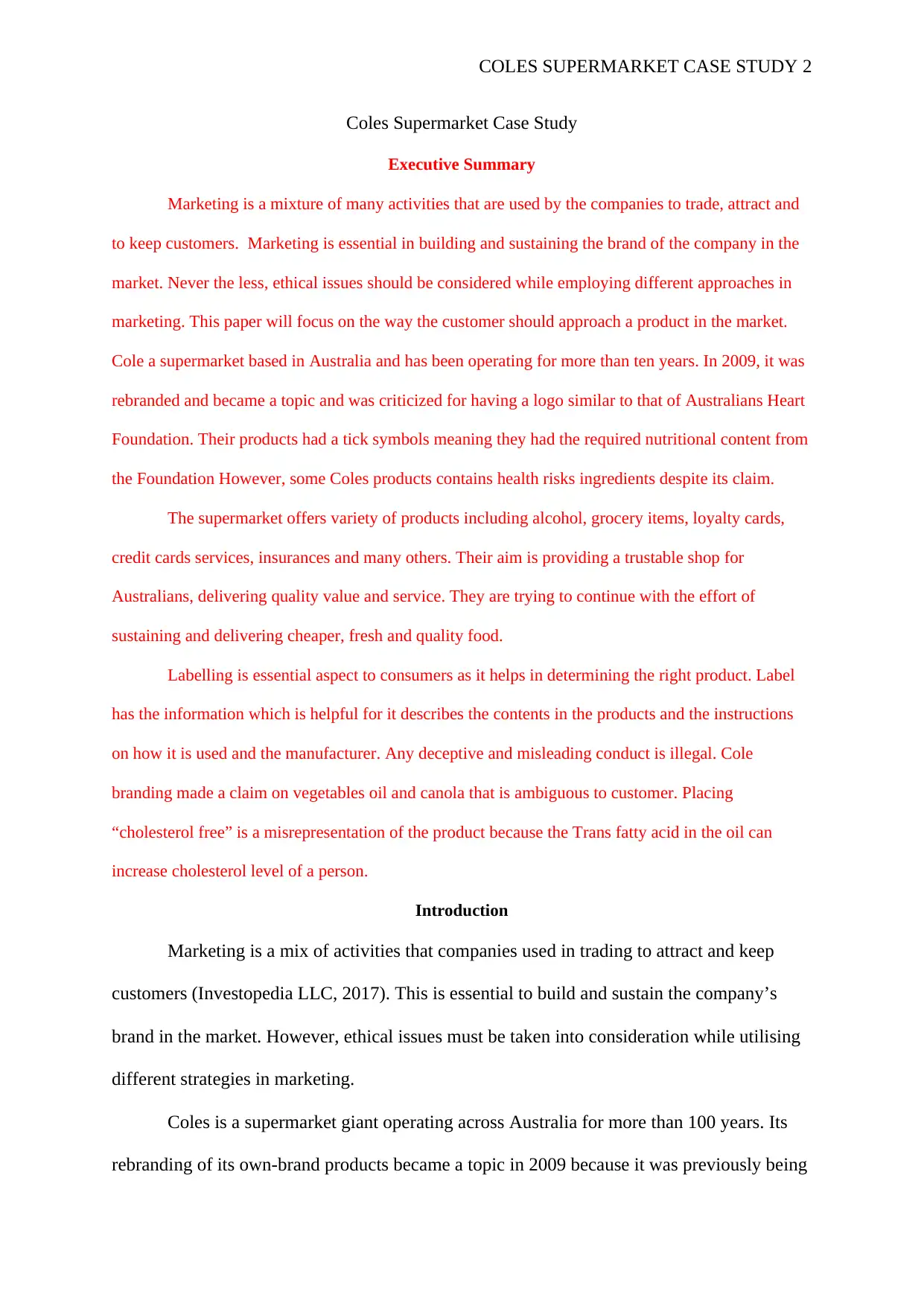
COLES SUPERMARKET CASE STUDY 2
Coles Supermarket Case Study
Executive Summary
Marketing is a mixture of many activities that are used by the companies to trade, attract and
to keep customers. Marketing is essential in building and sustaining the brand of the company in the
market. Never the less, ethical issues should be considered while employing different approaches in
marketing. This paper will focus on the way the customer should approach a product in the market.
Cole a supermarket based in Australia and has been operating for more than ten years. In 2009, it was
rebranded and became a topic and was criticized for having a logo similar to that of Australians Heart
Foundation. Their products had a tick symbols meaning they had the required nutritional content from
the Foundation However, some Coles products contains health risks ingredients despite its claim.
The supermarket offers variety of products including alcohol, grocery items, loyalty cards,
credit cards services, insurances and many others. Their aim is providing a trustable shop for
Australians, delivering quality value and service. They are trying to continue with the effort of
sustaining and delivering cheaper, fresh and quality food.
Labelling is essential aspect to consumers as it helps in determining the right product. Label
has the information which is helpful for it describes the contents in the products and the instructions
on how it is used and the manufacturer. Any deceptive and misleading conduct is illegal. Cole
branding made a claim on vegetables oil and canola that is ambiguous to customer. Placing
“cholesterol free” is a misrepresentation of the product because the Trans fatty acid in the oil can
increase cholesterol level of a person.
Introduction
Marketing is a mix of activities that companies used in trading to attract and keep
customers (Investopedia LLC, 2017). This is essential to build and sustain the company’s
brand in the market. However, ethical issues must be taken into consideration while utilising
different strategies in marketing.
Coles is a supermarket giant operating across Australia for more than 100 years. Its
rebranding of its own-brand products became a topic in 2009 because it was previously being
Coles Supermarket Case Study
Executive Summary
Marketing is a mixture of many activities that are used by the companies to trade, attract and
to keep customers. Marketing is essential in building and sustaining the brand of the company in the
market. Never the less, ethical issues should be considered while employing different approaches in
marketing. This paper will focus on the way the customer should approach a product in the market.
Cole a supermarket based in Australia and has been operating for more than ten years. In 2009, it was
rebranded and became a topic and was criticized for having a logo similar to that of Australians Heart
Foundation. Their products had a tick symbols meaning they had the required nutritional content from
the Foundation However, some Coles products contains health risks ingredients despite its claim.
The supermarket offers variety of products including alcohol, grocery items, loyalty cards,
credit cards services, insurances and many others. Their aim is providing a trustable shop for
Australians, delivering quality value and service. They are trying to continue with the effort of
sustaining and delivering cheaper, fresh and quality food.
Labelling is essential aspect to consumers as it helps in determining the right product. Label
has the information which is helpful for it describes the contents in the products and the instructions
on how it is used and the manufacturer. Any deceptive and misleading conduct is illegal. Cole
branding made a claim on vegetables oil and canola that is ambiguous to customer. Placing
“cholesterol free” is a misrepresentation of the product because the Trans fatty acid in the oil can
increase cholesterol level of a person.
Introduction
Marketing is a mix of activities that companies used in trading to attract and keep
customers (Investopedia LLC, 2017). This is essential to build and sustain the company’s
brand in the market. However, ethical issues must be taken into consideration while utilising
different strategies in marketing.
Coles is a supermarket giant operating across Australia for more than 100 years. Its
rebranding of its own-brand products became a topic in 2009 because it was previously being
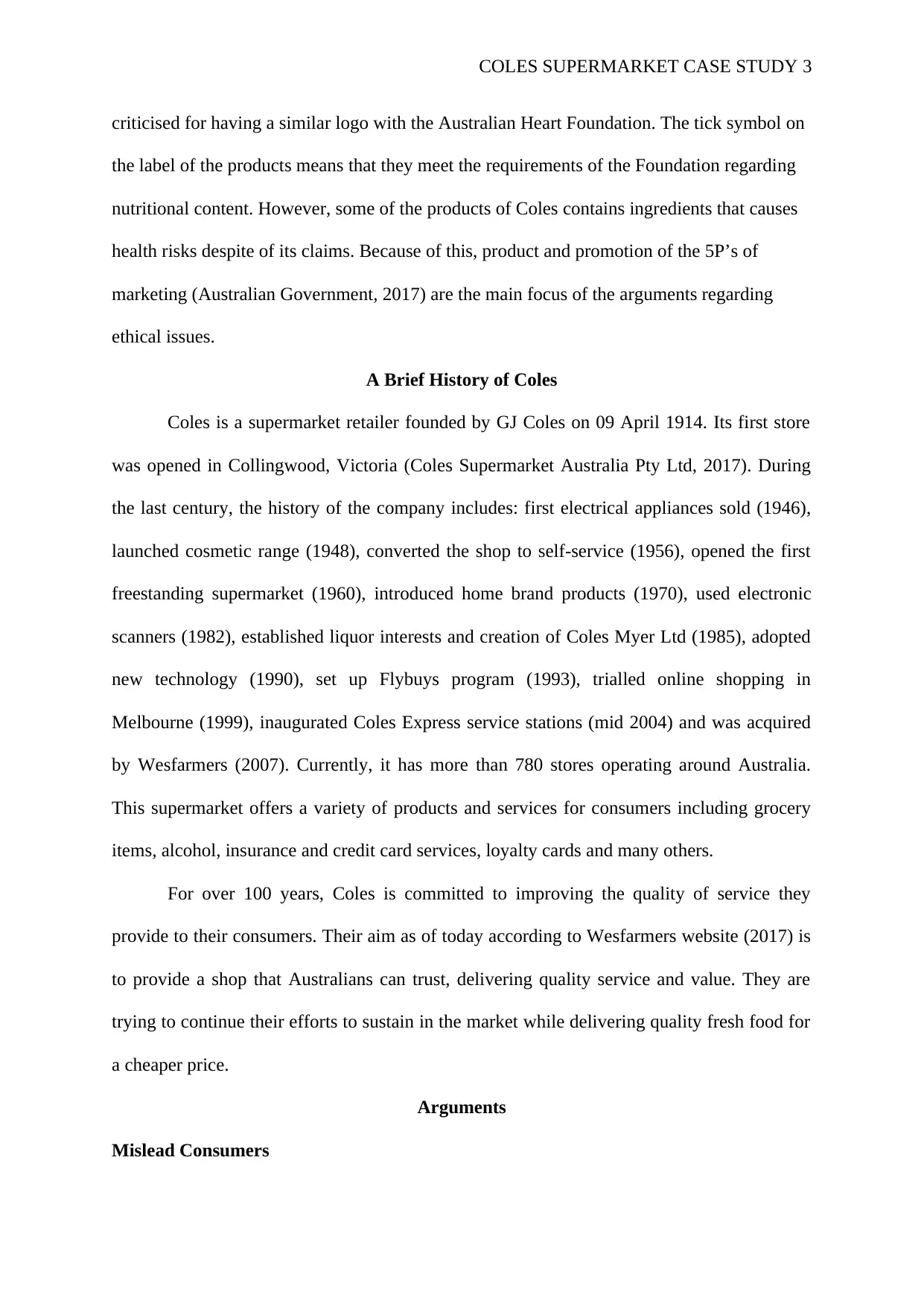
COLES SUPERMARKET CASE STUDY 3
criticised for having a similar logo with the Australian Heart Foundation. The tick symbol on
the label of the products means that they meet the requirements of the Foundation regarding
nutritional content. However, some of the products of Coles contains ingredients that causes
health risks despite of its claims. Because of this, product and promotion of the 5P’s of
marketing (Australian Government, 2017) are the main focus of the arguments regarding
ethical issues.
A Brief History of Coles
Coles is a supermarket retailer founded by GJ Coles on 09 April 1914. Its first store
was opened in Collingwood, Victoria (Coles Supermarket Australia Pty Ltd, 2017). During
the last century, the history of the company includes: first electrical appliances sold (1946),
launched cosmetic range (1948), converted the shop to self-service (1956), opened the first
freestanding supermarket (1960), introduced home brand products (1970), used electronic
scanners (1982), established liquor interests and creation of Coles Myer Ltd (1985), adopted
new technology (1990), set up Flybuys program (1993), trialled online shopping in
Melbourne (1999), inaugurated Coles Express service stations (mid 2004) and was acquired
by Wesfarmers (2007). Currently, it has more than 780 stores operating around Australia.
This supermarket offers a variety of products and services for consumers including grocery
items, alcohol, insurance and credit card services, loyalty cards and many others.
For over 100 years, Coles is committed to improving the quality of service they
provide to their consumers. Their aim as of today according to Wesfarmers website (2017) is
to provide a shop that Australians can trust, delivering quality service and value. They are
trying to continue their efforts to sustain in the market while delivering quality fresh food for
a cheaper price.
Arguments
Mislead Consumers
criticised for having a similar logo with the Australian Heart Foundation. The tick symbol on
the label of the products means that they meet the requirements of the Foundation regarding
nutritional content. However, some of the products of Coles contains ingredients that causes
health risks despite of its claims. Because of this, product and promotion of the 5P’s of
marketing (Australian Government, 2017) are the main focus of the arguments regarding
ethical issues.
A Brief History of Coles
Coles is a supermarket retailer founded by GJ Coles on 09 April 1914. Its first store
was opened in Collingwood, Victoria (Coles Supermarket Australia Pty Ltd, 2017). During
the last century, the history of the company includes: first electrical appliances sold (1946),
launched cosmetic range (1948), converted the shop to self-service (1956), opened the first
freestanding supermarket (1960), introduced home brand products (1970), used electronic
scanners (1982), established liquor interests and creation of Coles Myer Ltd (1985), adopted
new technology (1990), set up Flybuys program (1993), trialled online shopping in
Melbourne (1999), inaugurated Coles Express service stations (mid 2004) and was acquired
by Wesfarmers (2007). Currently, it has more than 780 stores operating around Australia.
This supermarket offers a variety of products and services for consumers including grocery
items, alcohol, insurance and credit card services, loyalty cards and many others.
For over 100 years, Coles is committed to improving the quality of service they
provide to their consumers. Their aim as of today according to Wesfarmers website (2017) is
to provide a shop that Australians can trust, delivering quality service and value. They are
trying to continue their efforts to sustain in the market while delivering quality fresh food for
a cheaper price.
Arguments
Mislead Consumers
⊘ This is a preview!⊘
Do you want full access?
Subscribe today to unlock all pages.

Trusted by 1+ million students worldwide
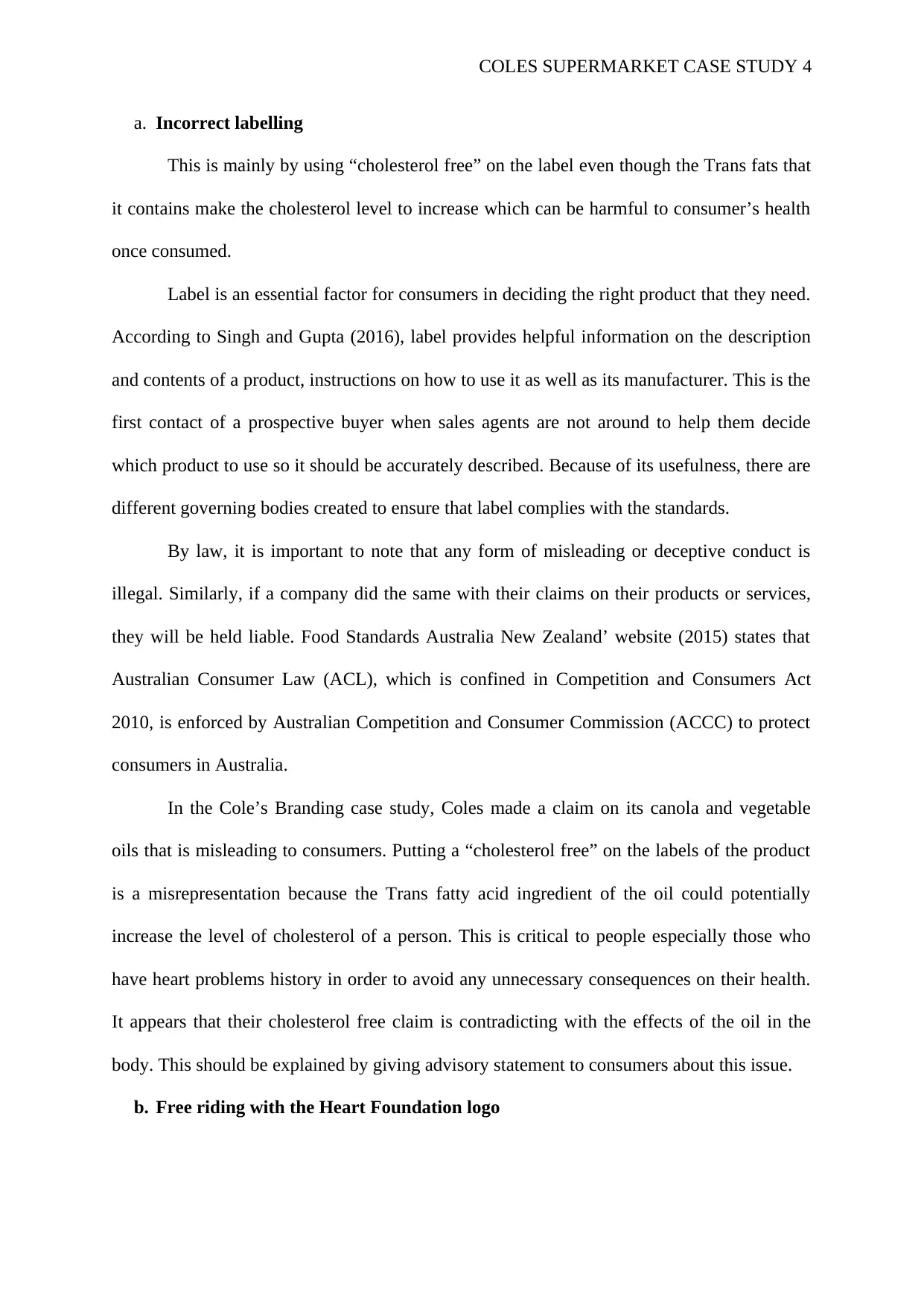
COLES SUPERMARKET CASE STUDY 4
a. Incorrect labelling
This is mainly by using “cholesterol free” on the label even though the Trans fats that
it contains make the cholesterol level to increase which can be harmful to consumer’s health
once consumed.
Label is an essential factor for consumers in deciding the right product that they need.
According to Singh and Gupta (2016), label provides helpful information on the description
and contents of a product, instructions on how to use it as well as its manufacturer. This is the
first contact of a prospective buyer when sales agents are not around to help them decide
which product to use so it should be accurately described. Because of its usefulness, there are
different governing bodies created to ensure that label complies with the standards.
By law, it is important to note that any form of misleading or deceptive conduct is
illegal. Similarly, if a company did the same with their claims on their products or services,
they will be held liable. Food Standards Australia New Zealand’ website (2015) states that
Australian Consumer Law (ACL), which is confined in Competition and Consumers Act
2010, is enforced by Australian Competition and Consumer Commission (ACCC) to protect
consumers in Australia.
In the Cole’s Branding case study, Coles made a claim on its canola and vegetable
oils that is misleading to consumers. Putting a “cholesterol free” on the labels of the product
is a misrepresentation because the Trans fatty acid ingredient of the oil could potentially
increase the level of cholesterol of a person. This is critical to people especially those who
have heart problems history in order to avoid any unnecessary consequences on their health.
It appears that their cholesterol free claim is contradicting with the effects of the oil in the
body. This should be explained by giving advisory statement to consumers about this issue.
b. Free riding with the Heart Foundation logo
a. Incorrect labelling
This is mainly by using “cholesterol free” on the label even though the Trans fats that
it contains make the cholesterol level to increase which can be harmful to consumer’s health
once consumed.
Label is an essential factor for consumers in deciding the right product that they need.
According to Singh and Gupta (2016), label provides helpful information on the description
and contents of a product, instructions on how to use it as well as its manufacturer. This is the
first contact of a prospective buyer when sales agents are not around to help them decide
which product to use so it should be accurately described. Because of its usefulness, there are
different governing bodies created to ensure that label complies with the standards.
By law, it is important to note that any form of misleading or deceptive conduct is
illegal. Similarly, if a company did the same with their claims on their products or services,
they will be held liable. Food Standards Australia New Zealand’ website (2015) states that
Australian Consumer Law (ACL), which is confined in Competition and Consumers Act
2010, is enforced by Australian Competition and Consumer Commission (ACCC) to protect
consumers in Australia.
In the Cole’s Branding case study, Coles made a claim on its canola and vegetable
oils that is misleading to consumers. Putting a “cholesterol free” on the labels of the product
is a misrepresentation because the Trans fatty acid ingredient of the oil could potentially
increase the level of cholesterol of a person. This is critical to people especially those who
have heart problems history in order to avoid any unnecessary consequences on their health.
It appears that their cholesterol free claim is contradicting with the effects of the oil in the
body. This should be explained by giving advisory statement to consumers about this issue.
b. Free riding with the Heart Foundation logo
Paraphrase This Document
Need a fresh take? Get an instant paraphrase of this document with our AI Paraphraser
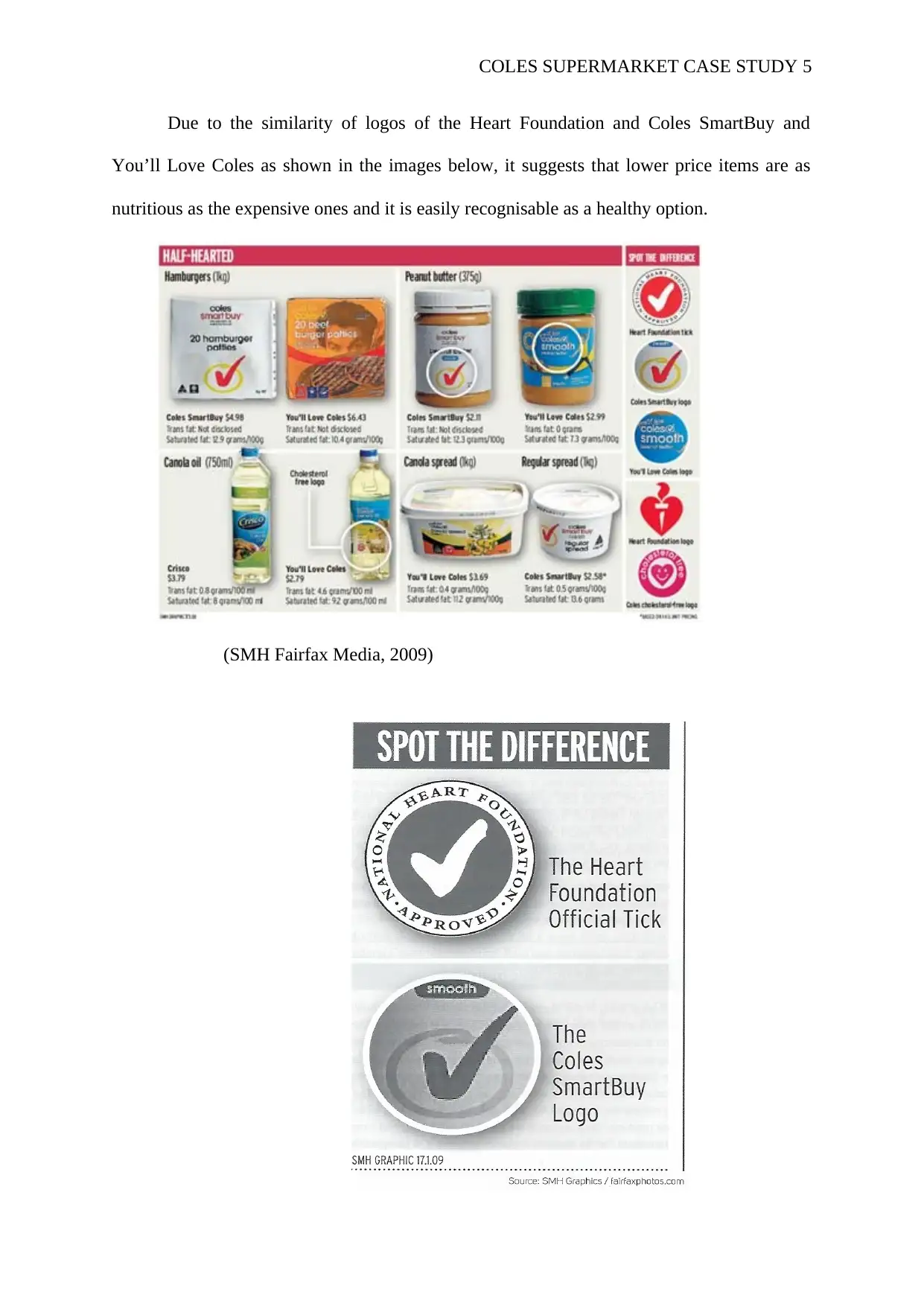
COLES SUPERMARKET CASE STUDY 5
Due to the similarity of logos of the Heart Foundation and Coles SmartBuy and
You’ll Love Coles as shown in the images below, it suggests that lower price items are as
nutritious as the expensive ones and it is easily recognisable as a healthy option.
(SMH Fairfax Media, 2009)
Due to the similarity of logos of the Heart Foundation and Coles SmartBuy and
You’ll Love Coles as shown in the images below, it suggests that lower price items are as
nutritious as the expensive ones and it is easily recognisable as a healthy option.
(SMH Fairfax Media, 2009)
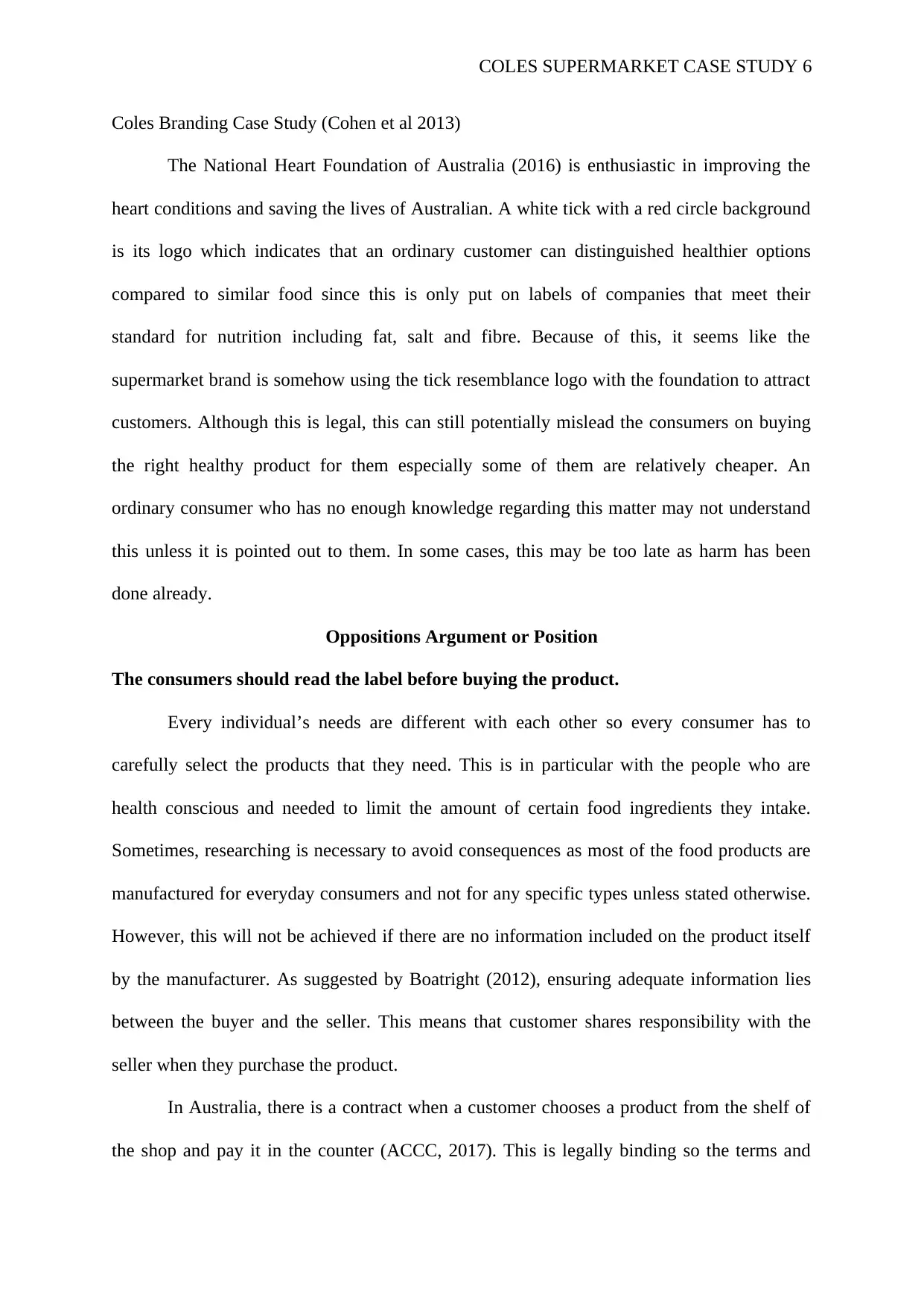
COLES SUPERMARKET CASE STUDY 6
Coles Branding Case Study (Cohen et al 2013)
The National Heart Foundation of Australia (2016) is enthusiastic in improving the
heart conditions and saving the lives of Australian. A white tick with a red circle background
is its logo which indicates that an ordinary customer can distinguished healthier options
compared to similar food since this is only put on labels of companies that meet their
standard for nutrition including fat, salt and fibre. Because of this, it seems like the
supermarket brand is somehow using the tick resemblance logo with the foundation to attract
customers. Although this is legal, this can still potentially mislead the consumers on buying
the right healthy product for them especially some of them are relatively cheaper. An
ordinary consumer who has no enough knowledge regarding this matter may not understand
this unless it is pointed out to them. In some cases, this may be too late as harm has been
done already.
Oppositions Argument or Position
The consumers should read the label before buying the product.
Every individual’s needs are different with each other so every consumer has to
carefully select the products that they need. This is in particular with the people who are
health conscious and needed to limit the amount of certain food ingredients they intake.
Sometimes, researching is necessary to avoid consequences as most of the food products are
manufactured for everyday consumers and not for any specific types unless stated otherwise.
However, this will not be achieved if there are no information included on the product itself
by the manufacturer. As suggested by Boatright (2012), ensuring adequate information lies
between the buyer and the seller. This means that customer shares responsibility with the
seller when they purchase the product.
In Australia, there is a contract when a customer chooses a product from the shelf of
the shop and pay it in the counter (ACCC, 2017). This is legally binding so the terms and
Coles Branding Case Study (Cohen et al 2013)
The National Heart Foundation of Australia (2016) is enthusiastic in improving the
heart conditions and saving the lives of Australian. A white tick with a red circle background
is its logo which indicates that an ordinary customer can distinguished healthier options
compared to similar food since this is only put on labels of companies that meet their
standard for nutrition including fat, salt and fibre. Because of this, it seems like the
supermarket brand is somehow using the tick resemblance logo with the foundation to attract
customers. Although this is legal, this can still potentially mislead the consumers on buying
the right healthy product for them especially some of them are relatively cheaper. An
ordinary consumer who has no enough knowledge regarding this matter may not understand
this unless it is pointed out to them. In some cases, this may be too late as harm has been
done already.
Oppositions Argument or Position
The consumers should read the label before buying the product.
Every individual’s needs are different with each other so every consumer has to
carefully select the products that they need. This is in particular with the people who are
health conscious and needed to limit the amount of certain food ingredients they intake.
Sometimes, researching is necessary to avoid consequences as most of the food products are
manufactured for everyday consumers and not for any specific types unless stated otherwise.
However, this will not be achieved if there are no information included on the product itself
by the manufacturer. As suggested by Boatright (2012), ensuring adequate information lies
between the buyer and the seller. This means that customer shares responsibility with the
seller when they purchase the product.
In Australia, there is a contract when a customer chooses a product from the shelf of
the shop and pay it in the counter (ACCC, 2017). This is legally binding so the terms and
⊘ This is a preview!⊘
Do you want full access?
Subscribe today to unlock all pages.

Trusted by 1+ million students worldwide
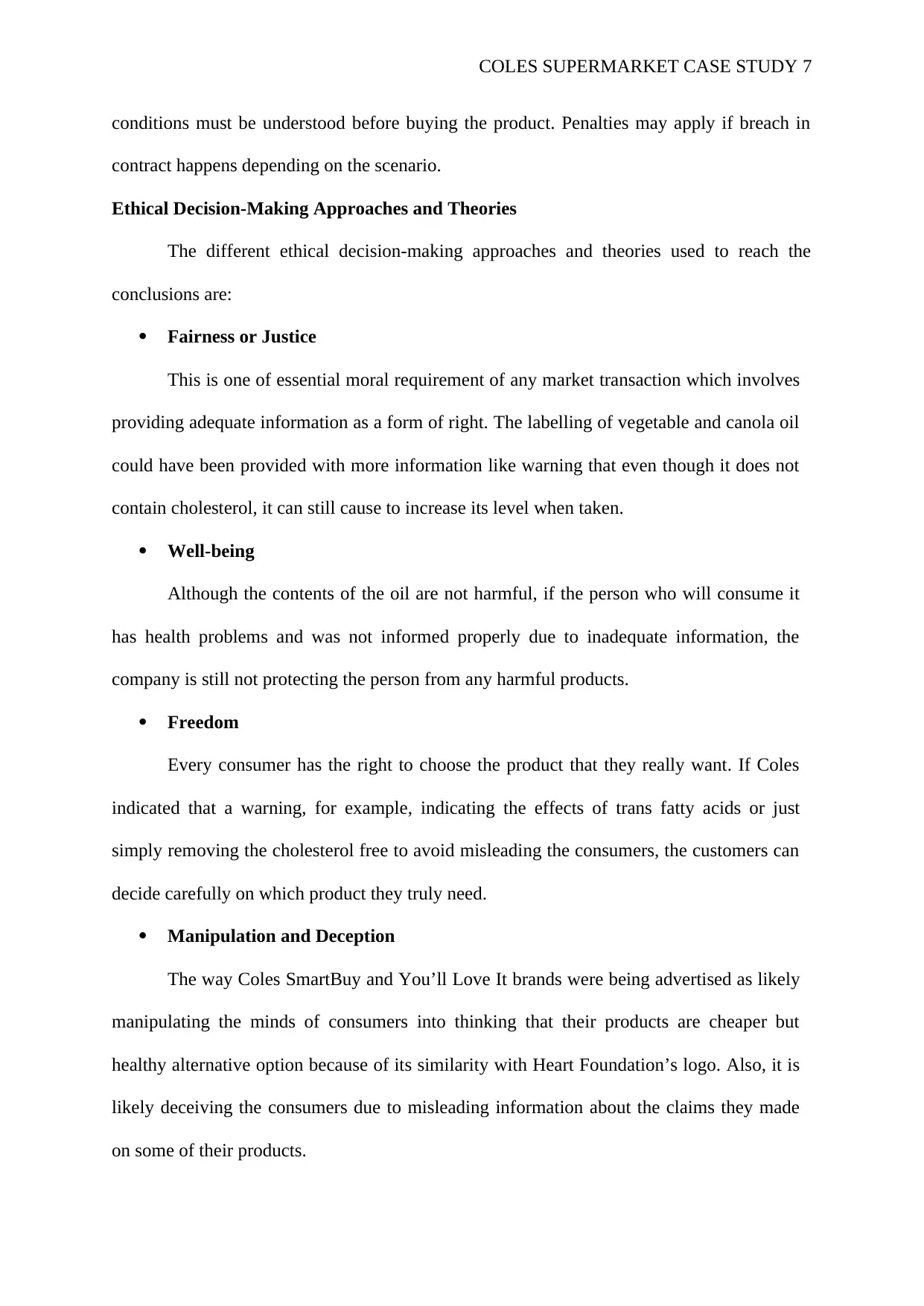
COLES SUPERMARKET CASE STUDY 7
conditions must be understood before buying the product. Penalties may apply if breach in
contract happens depending on the scenario.
Ethical Decision-Making Approaches and Theories
The different ethical decision-making approaches and theories used to reach the
conclusions are:
Fairness or Justice
This is one of essential moral requirement of any market transaction which involves
providing adequate information as a form of right. The labelling of vegetable and canola oil
could have been provided with more information like warning that even though it does not
contain cholesterol, it can still cause to increase its level when taken.
Well-being
Although the contents of the oil are not harmful, if the person who will consume it
has health problems and was not informed properly due to inadequate information, the
company is still not protecting the person from any harmful products.
Freedom
Every consumer has the right to choose the product that they really want. If Coles
indicated that a warning, for example, indicating the effects of trans fatty acids or just
simply removing the cholesterol free to avoid misleading the consumers, the customers can
decide carefully on which product they truly need.
Manipulation and Deception
The way Coles SmartBuy and You’ll Love It brands were being advertised as likely
manipulating the minds of consumers into thinking that their products are cheaper but
healthy alternative option because of its similarity with Heart Foundation’s logo. Also, it is
likely deceiving the consumers due to misleading information about the claims they made
on some of their products.
conditions must be understood before buying the product. Penalties may apply if breach in
contract happens depending on the scenario.
Ethical Decision-Making Approaches and Theories
The different ethical decision-making approaches and theories used to reach the
conclusions are:
Fairness or Justice
This is one of essential moral requirement of any market transaction which involves
providing adequate information as a form of right. The labelling of vegetable and canola oil
could have been provided with more information like warning that even though it does not
contain cholesterol, it can still cause to increase its level when taken.
Well-being
Although the contents of the oil are not harmful, if the person who will consume it
has health problems and was not informed properly due to inadequate information, the
company is still not protecting the person from any harmful products.
Freedom
Every consumer has the right to choose the product that they really want. If Coles
indicated that a warning, for example, indicating the effects of trans fatty acids or just
simply removing the cholesterol free to avoid misleading the consumers, the customers can
decide carefully on which product they truly need.
Manipulation and Deception
The way Coles SmartBuy and You’ll Love It brands were being advertised as likely
manipulating the minds of consumers into thinking that their products are cheaper but
healthy alternative option because of its similarity with Heart Foundation’s logo. Also, it is
likely deceiving the consumers due to misleading information about the claims they made
on some of their products.
Paraphrase This Document
Need a fresh take? Get an instant paraphrase of this document with our AI Paraphraser
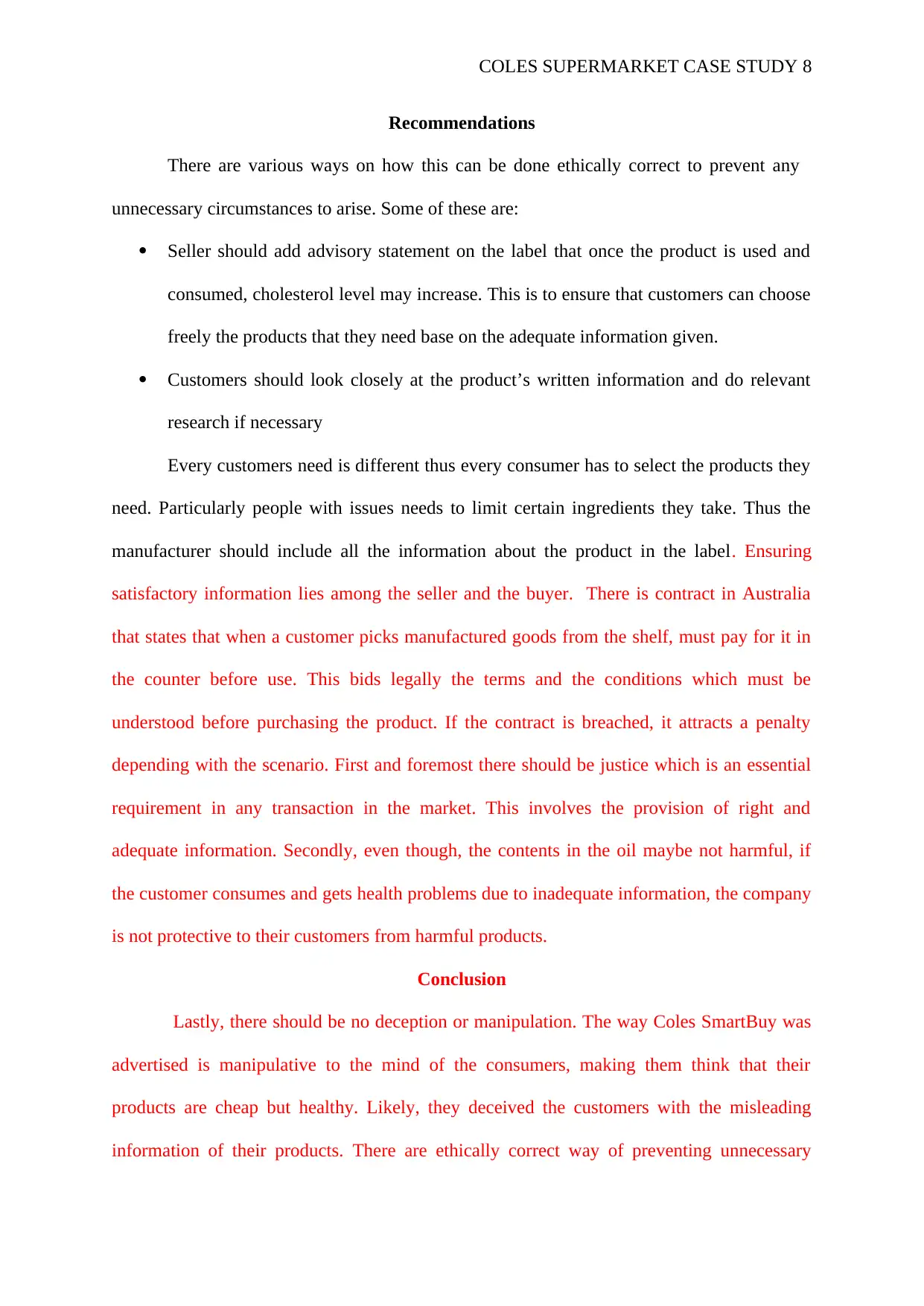
COLES SUPERMARKET CASE STUDY 8
Recommendations
There are various ways on how this can be done ethically correct to prevent any
unnecessary circumstances to arise. Some of these are:
Seller should add advisory statement on the label that once the product is used and
consumed, cholesterol level may increase. This is to ensure that customers can choose
freely the products that they need base on the adequate information given.
Customers should look closely at the product’s written information and do relevant
research if necessary
Every customers need is different thus every consumer has to select the products they
need. Particularly people with issues needs to limit certain ingredients they take. Thus the
manufacturer should include all the information about the product in the label. Ensuring
satisfactory information lies among the seller and the buyer. There is contract in Australia
that states that when a customer picks manufactured goods from the shelf, must pay for it in
the counter before use. This bids legally the terms and the conditions which must be
understood before purchasing the product. If the contract is breached, it attracts a penalty
depending with the scenario. First and foremost there should be justice which is an essential
requirement in any transaction in the market. This involves the provision of right and
adequate information. Secondly, even though, the contents in the oil maybe not harmful, if
the customer consumes and gets health problems due to inadequate information, the company
is not protective to their customers from harmful products.
Conclusion
Lastly, there should be no deception or manipulation. The way Coles SmartBuy was
advertised is manipulative to the mind of the consumers, making them think that their
products are cheap but healthy. Likely, they deceived the customers with the misleading
information of their products. There are ethically correct way of preventing unnecessary
Recommendations
There are various ways on how this can be done ethically correct to prevent any
unnecessary circumstances to arise. Some of these are:
Seller should add advisory statement on the label that once the product is used and
consumed, cholesterol level may increase. This is to ensure that customers can choose
freely the products that they need base on the adequate information given.
Customers should look closely at the product’s written information and do relevant
research if necessary
Every customers need is different thus every consumer has to select the products they
need. Particularly people with issues needs to limit certain ingredients they take. Thus the
manufacturer should include all the information about the product in the label. Ensuring
satisfactory information lies among the seller and the buyer. There is contract in Australia
that states that when a customer picks manufactured goods from the shelf, must pay for it in
the counter before use. This bids legally the terms and the conditions which must be
understood before purchasing the product. If the contract is breached, it attracts a penalty
depending with the scenario. First and foremost there should be justice which is an essential
requirement in any transaction in the market. This involves the provision of right and
adequate information. Secondly, even though, the contents in the oil maybe not harmful, if
the customer consumes and gets health problems due to inadequate information, the company
is not protective to their customers from harmful products.
Conclusion
Lastly, there should be no deception or manipulation. The way Coles SmartBuy was
advertised is manipulative to the mind of the consumers, making them think that their
products are cheap but healthy. Likely, they deceived the customers with the misleading
information of their products. There are ethically correct way of preventing unnecessary
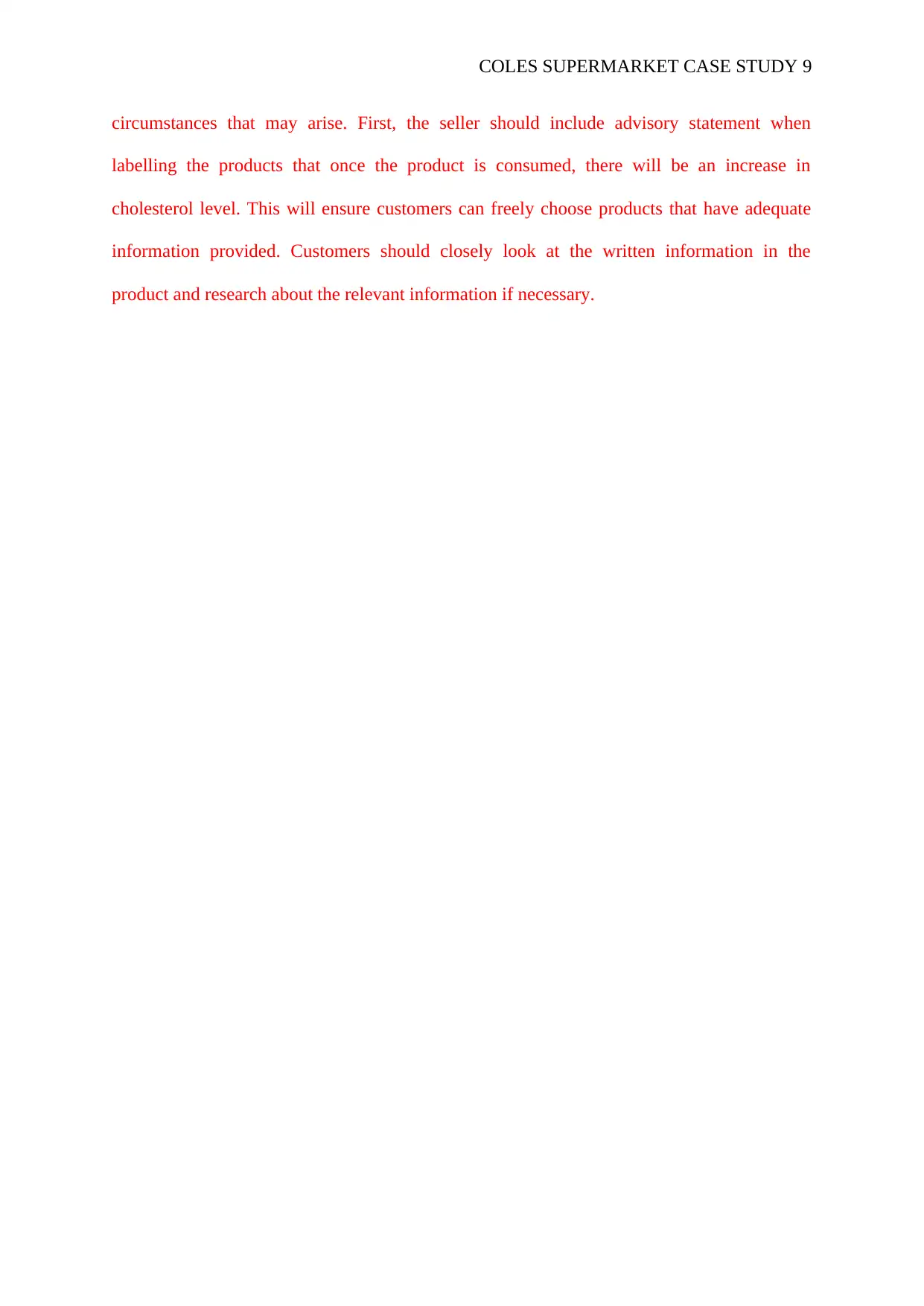
COLES SUPERMARKET CASE STUDY 9
circumstances that may arise. First, the seller should include advisory statement when
labelling the products that once the product is consumed, there will be an increase in
cholesterol level. This will ensure customers can freely choose products that have adequate
information provided. Customers should closely look at the written information in the
product and research about the relevant information if necessary.
circumstances that may arise. First, the seller should include advisory statement when
labelling the products that once the product is consumed, there will be an increase in
cholesterol level. This will ensure customers can freely choose products that have adequate
information provided. Customers should closely look at the written information in the
product and research about the relevant information if necessary.
⊘ This is a preview!⊘
Do you want full access?
Subscribe today to unlock all pages.

Trusted by 1+ million students worldwide
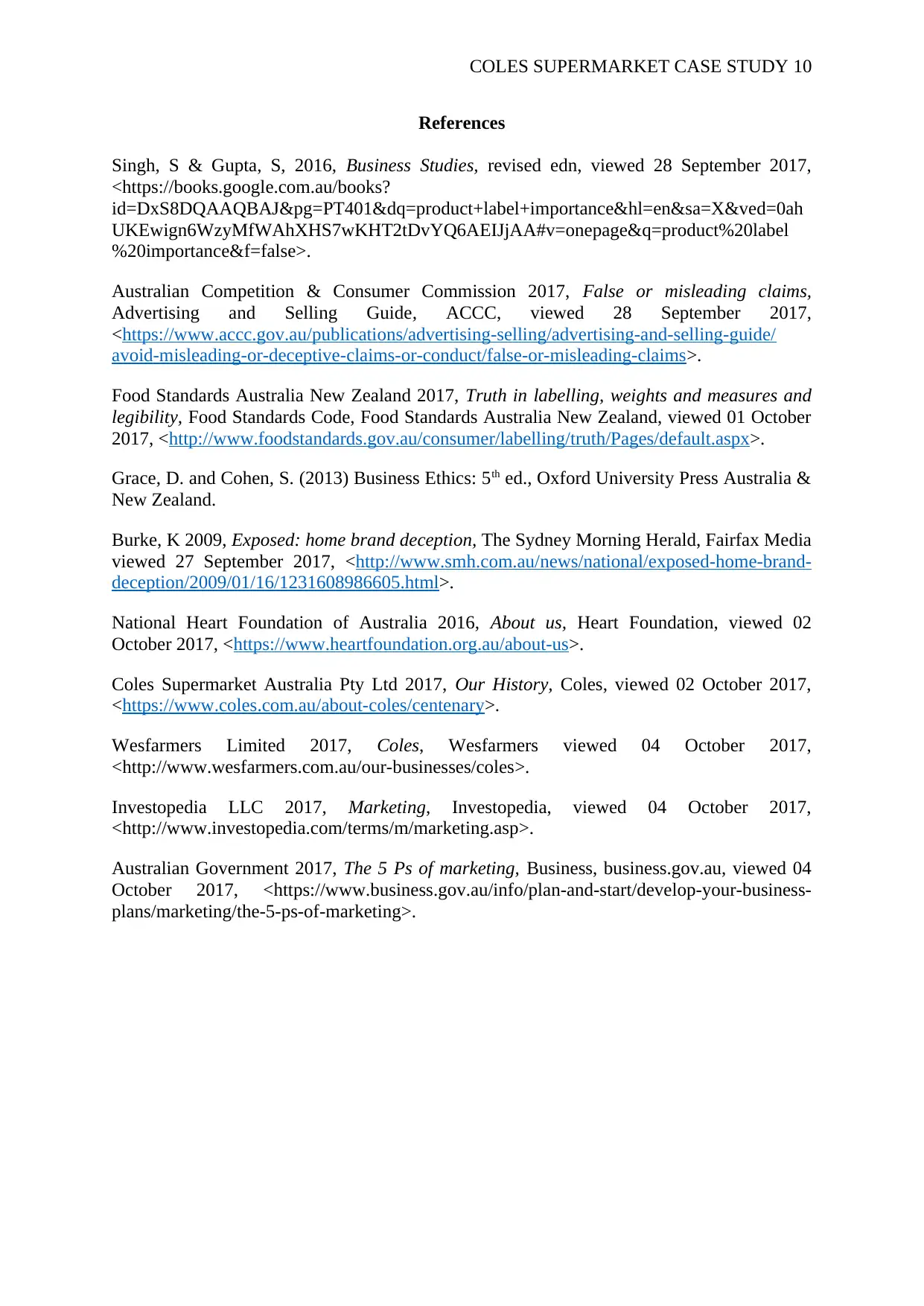
COLES SUPERMARKET CASE STUDY 10
References
Singh, S & Gupta, S, 2016, Business Studies, revised edn, viewed 28 September 2017,
<https://books.google.com.au/books?
id=DxS8DQAAQBAJ&pg=PT401&dq=product+label+importance&hl=en&sa=X&ved=0ah
UKEwign6WzyMfWAhXHS7wKHT2tDvYQ6AEIJjAA#v=onepage&q=product%20label
%20importance&f=false>.
Australian Competition & Consumer Commission 2017, False or misleading claims,
Advertising and Selling Guide, ACCC, viewed 28 September 2017,
<https://www.accc.gov.au/publications/advertising-selling/advertising-and-selling-guide/
avoid-misleading-or-deceptive-claims-or-conduct/false-or-misleading-claims>.
Food Standards Australia New Zealand 2017, Truth in labelling, weights and measures and
legibility, Food Standards Code, Food Standards Australia New Zealand, viewed 01 October
2017, <http://www.foodstandards.gov.au/consumer/labelling/truth/Pages/default.aspx>.
Grace, D. and Cohen, S. (2013) Business Ethics: 5th ed., Oxford University Press Australia &
New Zealand.
Burke, K 2009, Exposed: home brand deception, The Sydney Morning Herald, Fairfax Media
viewed 27 September 2017, <http://www.smh.com.au/news/national/exposed-home-brand-
deception/2009/01/16/1231608986605.html>.
National Heart Foundation of Australia 2016, About us, Heart Foundation, viewed 02
October 2017, <https://www.heartfoundation.org.au/about-us>.
Coles Supermarket Australia Pty Ltd 2017, Our History, Coles, viewed 02 October 2017,
<https://www.coles.com.au/about-coles/centenary>.
Wesfarmers Limited 2017, Coles, Wesfarmers viewed 04 October 2017,
<http://www.wesfarmers.com.au/our-businesses/coles>.
Investopedia LLC 2017, Marketing, Investopedia, viewed 04 October 2017,
<http://www.investopedia.com/terms/m/marketing.asp>.
Australian Government 2017, The 5 Ps of marketing, Business, business.gov.au, viewed 04
October 2017, <https://www.business.gov.au/info/plan-and-start/develop-your-business-
plans/marketing/the-5-ps-of-marketing>.
References
Singh, S & Gupta, S, 2016, Business Studies, revised edn, viewed 28 September 2017,
<https://books.google.com.au/books?
id=DxS8DQAAQBAJ&pg=PT401&dq=product+label+importance&hl=en&sa=X&ved=0ah
UKEwign6WzyMfWAhXHS7wKHT2tDvYQ6AEIJjAA#v=onepage&q=product%20label
%20importance&f=false>.
Australian Competition & Consumer Commission 2017, False or misleading claims,
Advertising and Selling Guide, ACCC, viewed 28 September 2017,
<https://www.accc.gov.au/publications/advertising-selling/advertising-and-selling-guide/
avoid-misleading-or-deceptive-claims-or-conduct/false-or-misleading-claims>.
Food Standards Australia New Zealand 2017, Truth in labelling, weights and measures and
legibility, Food Standards Code, Food Standards Australia New Zealand, viewed 01 October
2017, <http://www.foodstandards.gov.au/consumer/labelling/truth/Pages/default.aspx>.
Grace, D. and Cohen, S. (2013) Business Ethics: 5th ed., Oxford University Press Australia &
New Zealand.
Burke, K 2009, Exposed: home brand deception, The Sydney Morning Herald, Fairfax Media
viewed 27 September 2017, <http://www.smh.com.au/news/national/exposed-home-brand-
deception/2009/01/16/1231608986605.html>.
National Heart Foundation of Australia 2016, About us, Heart Foundation, viewed 02
October 2017, <https://www.heartfoundation.org.au/about-us>.
Coles Supermarket Australia Pty Ltd 2017, Our History, Coles, viewed 02 October 2017,
<https://www.coles.com.au/about-coles/centenary>.
Wesfarmers Limited 2017, Coles, Wesfarmers viewed 04 October 2017,
<http://www.wesfarmers.com.au/our-businesses/coles>.
Investopedia LLC 2017, Marketing, Investopedia, viewed 04 October 2017,
<http://www.investopedia.com/terms/m/marketing.asp>.
Australian Government 2017, The 5 Ps of marketing, Business, business.gov.au, viewed 04
October 2017, <https://www.business.gov.au/info/plan-and-start/develop-your-business-
plans/marketing/the-5-ps-of-marketing>.
1 out of 10
Your All-in-One AI-Powered Toolkit for Academic Success.
+13062052269
info@desklib.com
Available 24*7 on WhatsApp / Email
![[object Object]](/_next/static/media/star-bottom.7253800d.svg)
Unlock your academic potential
Copyright © 2020–2025 A2Z Services. All Rights Reserved. Developed and managed by ZUCOL.